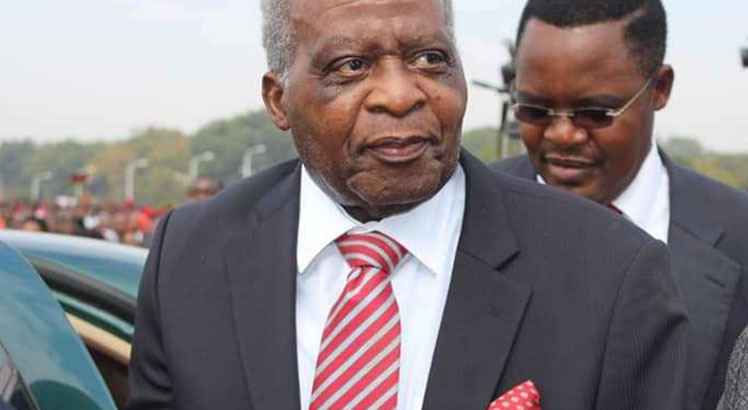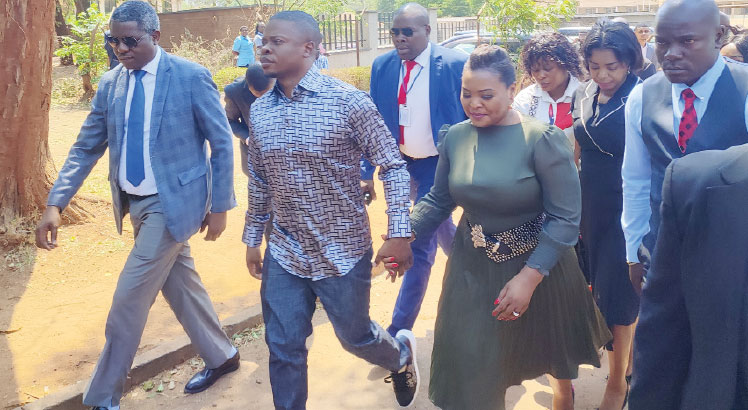End of an era
We are heartbroken. We can’t make any sense of this,” a grief-stricken John Tembo Junior mumbled as he faced journalists at Lilongwe Private Clinic in Area 10 in the capital city.
He had just walked out from a ward where his father, John Zenus Ungapake Tembo, widely addressed by his initials JZU, was admitted and had earlier slipped into a coma.
“We knew such a day would come, but we didn’t know it would come as soon as this,” said John Tembo Junior wearing a face seemingly filled with forced bravery amid agony.
It was an end of an era for the veteran politician, who has been a colossal piece of Malawi’s political cloth since the 1960s. JZU has died at 91.
Immediately after John Tembo Junior had broken the news, people started trickling to the facility. They included Malawi Government officials, members of Parliament (MPs), family members and others.
Former Malawi Government official hostess and founding president Hastings Kamuzu Banda’s longtime confidante Cecilia Tamanda-Kadzamira, a niece to Tembo, was among the notable personalities alongside medical doctor-turned politician Hetherwick Ntaba and Malawi Congress Party (MCP) secretary general Eisenhower Mkaka.
In his homage, Mkaka said: “When you talk about the history of the country, he was the remaining symbol of the fight against colonialism. He served the nation in so many capacities.”

Lilongwe yesterday
Vice-President Saulos Chilima and his wife Mary, in a statement issued yesterday, described JZU’s death as painful.
“On the sad passing on of Honourable JZU Tembo, we are seized by grief and sadness, and extend our sincere condolences to the family and friends for this painful loss,” the Second Couple eulogised.
In an interview yesterday, former president Bakili Muluzi expressed sadness over the death of Tembo, whom he described as “a great statesman of his generation”.
He said: “First of all, let me convey my condolences to the bereaved family and to the people of Malawi. His departure has shocked me.”
Muluzi, who used to verbally tussle with JZU on the political front when the deceased served as Leader of Opposition in Parliament during his tenure, said he fought him because he knew Tembo had political stamina.
He said: “He is someone who was in politics for almost all his life… There is no permanent enemy in politics and as far as I am concerned, he was very close to me.
“He was treasurer-general of the party [MCP] when I was secretary-general. So, as you can see, we were very close.”
Former president Peter Mutharika, through a delegation he dispatched to Lilongwe Private Clinic upon learning about Tembo’s death, hailed the him as a leader who helped to shape the country’s development.
The Democratic Progressive Party delegation comprised former minister of Education George Chaponda, the party’s organising secretary Chimwemwe Chipungu and Mutharika’s former security chief Norman Chisale.
Minister of Information and Digitisation Moses Kunkuyu, in a separate interview, said JZU helped to setup resilient infrastructure in various sectors of the economy.
He said: “When you associate MCP with strong infrastructure development, strong education infrastructure, talk of strong roads in the country and a vibrant agriculture sector, there were people that made this happen in the country. Those people include JZU.”
Besides leading MCP as president and serving as Dedza South MP, Tembo also held various prominent capacities, including that of Reserve Bank of Malawi governor, Cabinet minister and chairperson of various companies during the one-party State under Kamuzu.
Tembo joined politics in the 1960s and became a key figure in the one-party MCP regime which was toppled in 1994 after the country embraced democracy through a June 1993 referendum.
He is survived by four children and will be buried in his home village in Traditional Authority Kasumbu in Dedza. He retired from politics in 2013 when he handed over the mantle to President Lazarus Chakwera to lead MCP after quitting the pulpit.
Profile
John Tembo was born on September 14 1932. He was married to Ruth Tembo, who predeceased him in 2015.
When Malawi became a republic in 1966 after attaining independence in 1964, founding president Hastings Kamuzu Banda appointed him as Minister of Finance. He also served as Reserve Bank of Malawi Governor in the 1970s.
Kamuzu later sent Tembo to the United States of America to study how democracy functions and on his return in 1989, he was appointed Minister without Portfolio.
Legal fights
In January 1995, months after Banda lost the elections to the United Democratic Front, Tembo and Kamuzu’s official hostess Cecilia Tamanda Kadzamira were put on trial for the murder in 1983 of four prominent Malawian politicians. They were Cabinet ministers Dick Matenje, Twaibu Sangala and Aaron Gadama and member of Parliament David Chiwanga. However, there was no direct evidence linking the accused to the murders and they were acquitted.
Presidential bid
After MCP narrowly lost the 1999 general elections to UDF, JZU mounted a battle to take over the leadership of the party. He succeeded as he replaced Gwanda Chakuamba as its president.
During the 2004 presidential elections, he finished second to UDF candidate Bingu wa Mutharika. His second go at the presidency was in 2009 when he lost to Mutharika again who had then formed his Democratic Progressive Party.
Following those losses, Tembo became a cunning Leader of Opposition in Parliament who tirelessly kept government on its toes. He is also widely credited for keeping MCP afloat amid patches of infighting.
Retirement from politics
In 2013, JZU hang up his political gloves after exhausting his two-term as MCP president in line with the party’s constitution. The current State President Lazarus Chakwera replaced him at a convention held that year., ending Tembo’s 50 year hold on the country’s politics.





